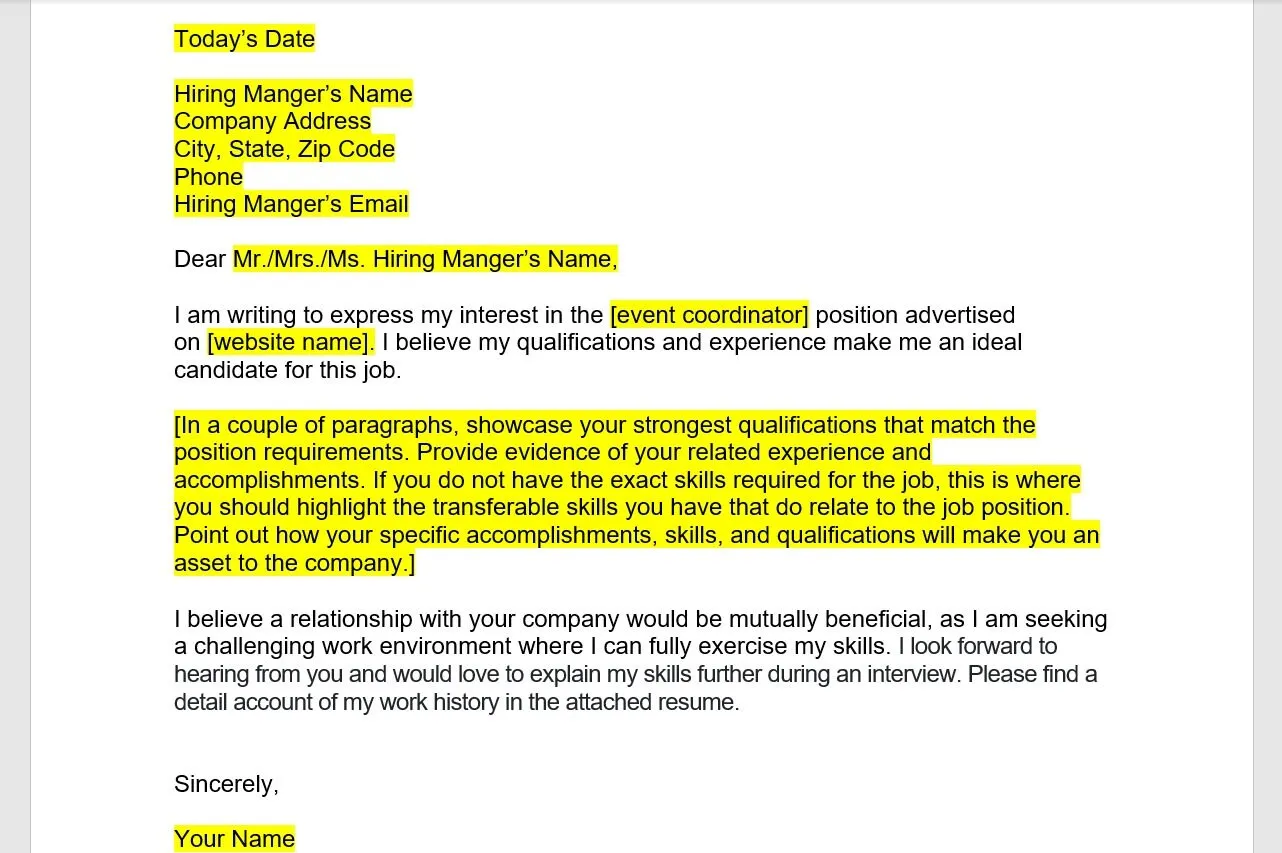Crafting Your Event Coordinator Cover Letter
Writing an event coordinator cover letter can feel daunting, especially if you lack direct experience. However, this is your opportunity to showcase your potential and convince the hiring manager you’re the right fit. This guide breaks down the process, providing actionable tips to create a compelling cover letter that highlights your strengths and secures you an interview. Remember, a well-crafted cover letter is more than just a formality; it’s your first impression and a crucial step in landing your dream job.
Highlighting Transferable Skills
Since you may not have direct event coordination experience, focus on your transferable skills. These are the abilities you’ve developed in other roles or activities that are relevant to event planning. Think about skills like project management, communication, organization, problem-solving, and customer service. Consider experiences from school projects, volunteer work, part-time jobs, or even personal hobbies. Identify how these skills can be applied to event planning, such as managing deadlines, communicating with a team, or handling unexpected situations.
Understanding the Importance of a Cover Letter
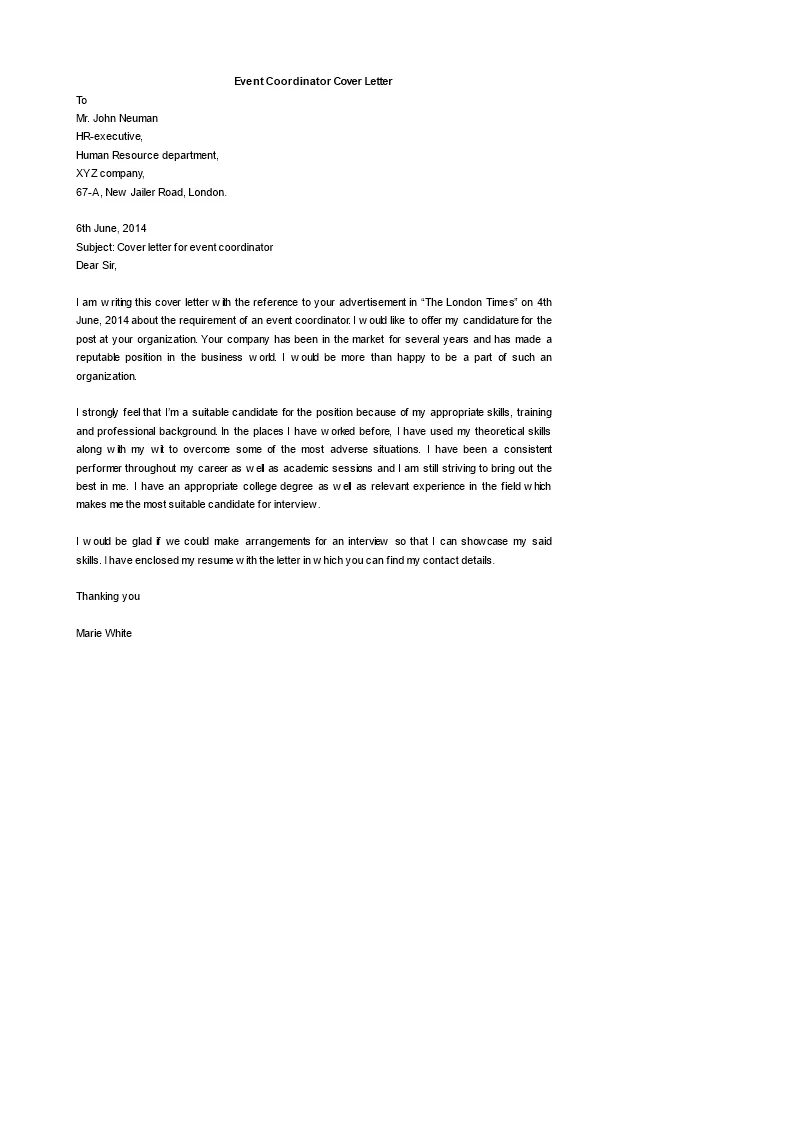
A cover letter serves as your introduction to the hiring manager. It’s where you can expand on your resume and express your personality. It demonstrates your genuine interest in the position and the company. It’s an opportunity to explain your career goals and how they align with the role. Additionally, it allows you to address any potential gaps in your experience, such as the lack of event planning experience, and reframe them as opportunities for growth and learning. A strong cover letter can significantly increase your chances of securing an interview.
Researching the Company and Role
Before you start writing, thoroughly research the company and the specific event coordinator role. Visit their website, social media profiles, and any news articles or press releases about them. Understand their values, mission, and the types of events they typically organize. Carefully read the job description to identify the key responsibilities and desired skills. Tailoring your cover letter to the specific company and role demonstrates that you’ve done your homework and are genuinely interested in the opportunity. This shows your commitment to contributing to their success.
Key Components of an Effective Cover Letter
A well-structured cover letter includes several key components that work together to make a strong impression. Each part plays a crucial role in communicating your qualifications and enthusiasm. Carefully consider what information goes in each section to present yourself in the best possible light. From the header to the closing, each section needs to be clear, concise, and compelling to grab the hiring manager’s attention.
Header and Contact Information
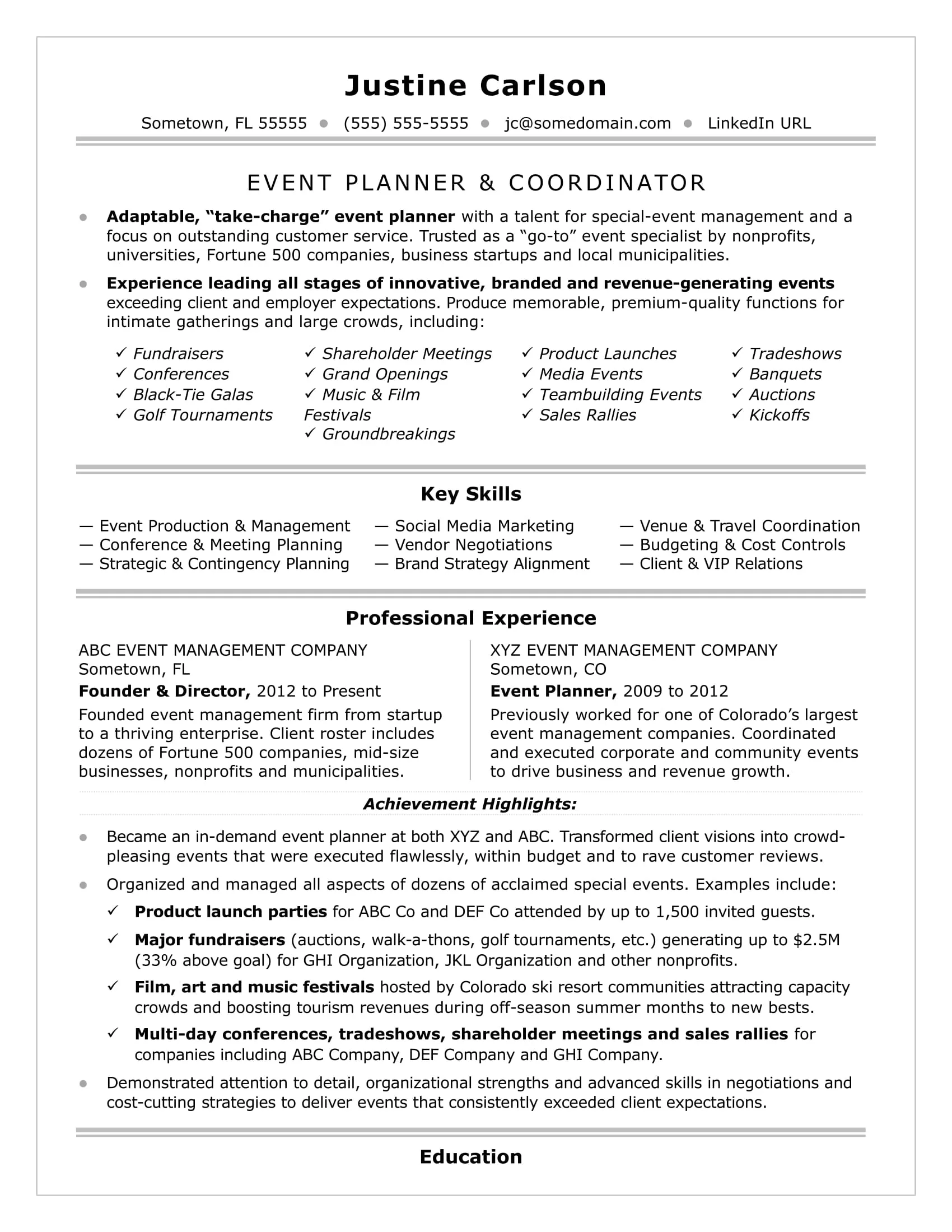
Start with a professional header that includes your name, address, phone number, and email address. Make sure your email address is professional-sounding (e.g., your.name@email.com). Include the date and the hiring manager’s name and title, if you know it, along with the company’s address. This demonstrates your attention to detail and shows that you have taken the time to find the correct contact information.
Greeting and Salutation
Use a professional greeting, such as “Dear Mr./Ms./Mx. [Last Name]”. If you don’t know the hiring manager’s name, “Dear Hiring Manager” or “Dear [Company Name] Team” are acceptable alternatives. Avoid generic greetings like “To Whom It May Concern.” End with a professional closing such as “Sincerely” or “Best regards,” followed by your full name. This sets a professional tone from the start.
Body Paragraphs
The body paragraphs are where you make your case. These paragraphs should be well-organized, concise, and compelling. Each paragraph should focus on a specific aspect of your qualifications and experience, highlighting how they relate to the event coordinator role. Avoid rambling or including irrelevant information. Keep your paragraphs focused and to the point, ensuring the hiring manager can quickly understand why you are a good fit for the position.
Opening Statement
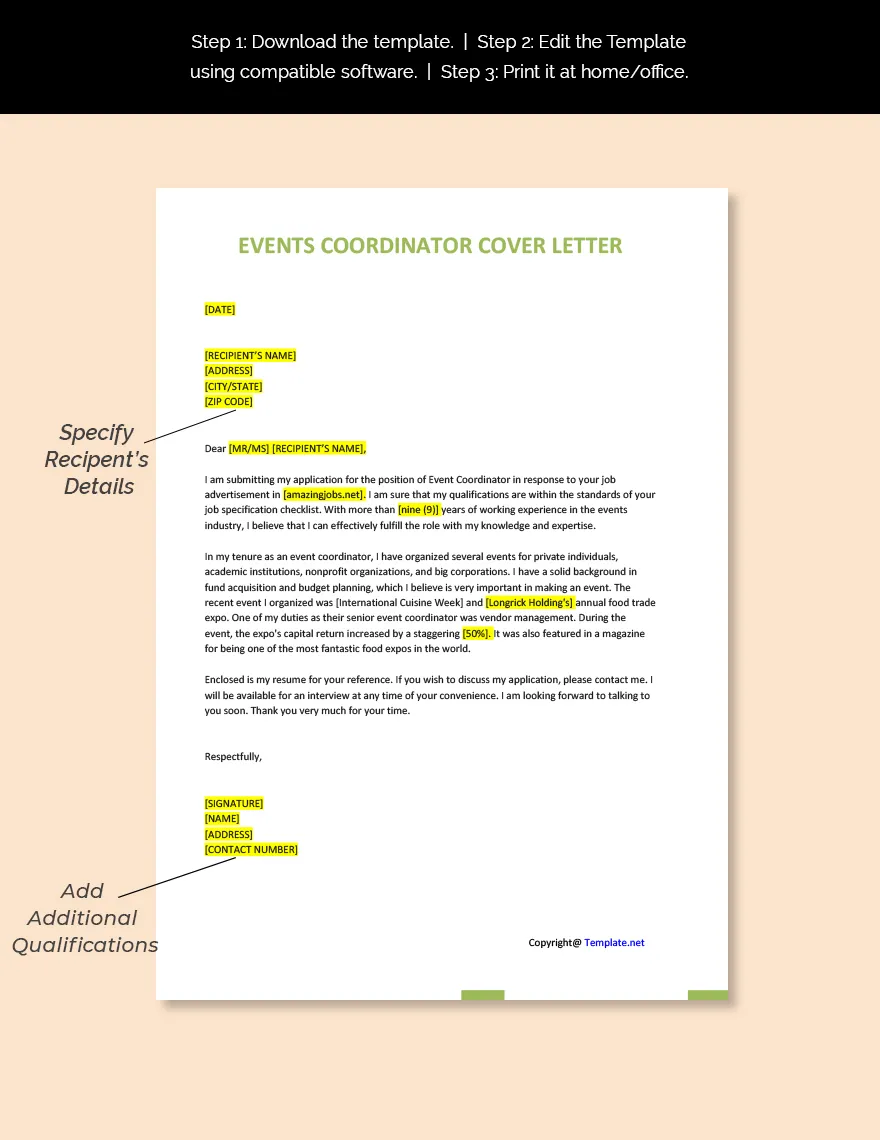
Begin with a strong opening statement that immediately grabs the reader’s attention. State the specific position you’re applying for and where you found the job posting. Express your enthusiasm for the role and the company. Briefly mention a key skill or experience that makes you a good fit. This initial paragraph should create a positive first impression and motivate the hiring manager to continue reading your letter.
Showcasing Passion and Enthusiasm
Showcase your genuine passion for event planning. This is crucial, especially if you lack direct experience. Share why you’re drawn to event coordination, what excites you about the field, and what kind of events you’re passionate about. Express your enthusiasm for the company and the role itself. Demonstrate your eagerness to learn and grow within the organization. Your passion can compensate for a lack of direct experience and make you a more appealing candidate.
Highlighting Relevant Skills
Identify the skills most relevant to the job description and illustrate how you’ve used them in past experiences. This might include communication, organization, time management, problem-solving, or customer service skills. Provide specific examples of how you’ve demonstrated these skills in previous roles or activities. Quantify your achievements whenever possible to show the impact you’ve made. This helps the hiring manager see how you can contribute to their team.
Quantifying Achievements (Even Without Experience)
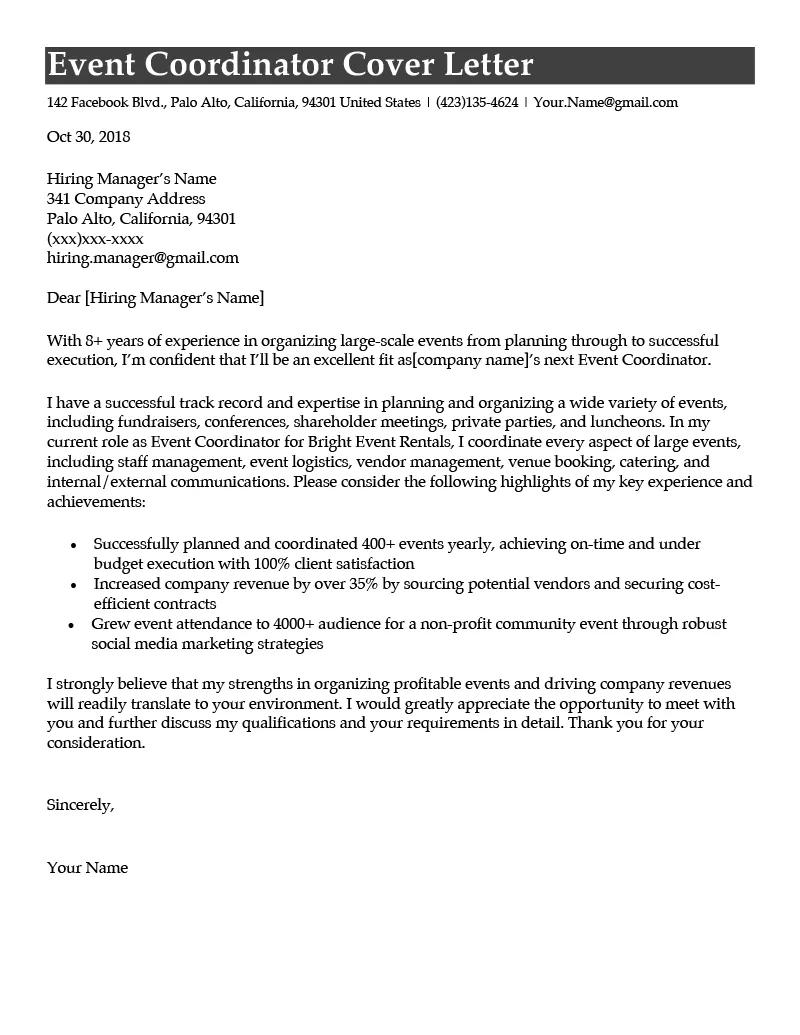
Even without direct event planning experience, you can still quantify your achievements. If you organized a school project, volunteer event, or managed a team, provide specific numbers to illustrate your impact. For instance, you could state that you “managed a team of five volunteers, resulting in a 20% increase in event attendance.” Use metrics to demonstrate your skills and abilities. Quantifiable results make your accomplishments more tangible and impressive to the hiring manager.
Addressing the Lack of Experience Directly
It’s important to address the lack of event coordination experience directly, but frame it positively. Acknowledge the gap, but then focus on your transferable skills, eagerness to learn, and the value you can bring. Mention any relevant courses, workshops, or certifications you’ve completed. Emphasize your adaptability, problem-solving abilities, and your commitment to quickly mastering the necessary skills. This shows self-awareness and a proactive approach to your career.
Closing Paragraph
In your closing paragraph, summarize your key qualifications and reiterate your enthusiasm for the role. Thank the hiring manager for their time and consideration. Express your interest in an interview and provide your contact information again. This final paragraph reinforces your interest and makes it easy for the hiring manager to contact you.
Call to Action and Expressing Interest
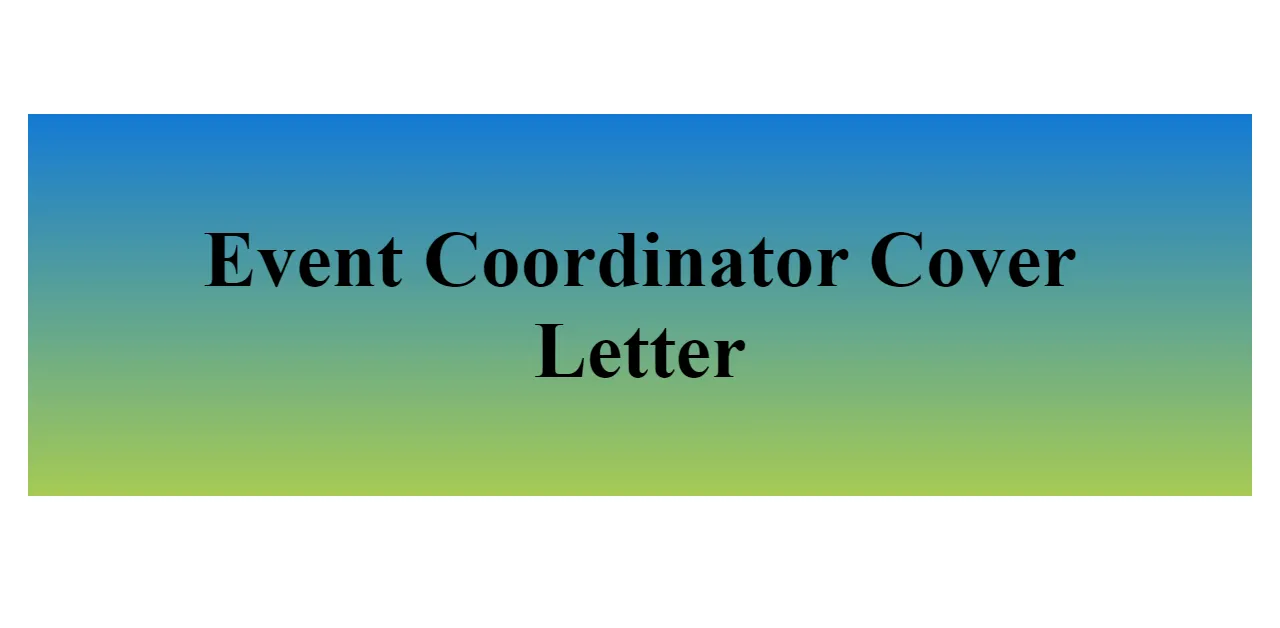
End your letter with a clear call to action. State that you are eager to discuss your qualifications further in an interview. Reiterate your interest in the position and express your availability for an interview. A strong call to action encourages the hiring manager to take the next step in the hiring process. Make it easy for them to contact you and schedule an interview.
Formatting and Presentation
The format and presentation of your cover letter are just as important as its content. The layout should be clean, professional, and easy to read. Choose a standard font, such as Times New Roman, Arial, or Calibri, in a readable size (11 or 12 points). Use consistent formatting throughout, including margins, spacing, and paragraph indentation. Avoid excessive use of bolding, underlining, or italics. A well-formatted cover letter demonstrates your attention to detail and professionalism.
Proofreading and Editing
Proofreading and editing are crucial to ensure your cover letter is error-free. Check for any grammatical errors, spelling mistakes, and punctuation issues. Read your cover letter multiple times, and ask a friend or family member to review it as well. Typos and grammatical errors can detract from your professionalism and make a negative impression. A polished cover letter shows you care about the details and are committed to delivering quality work.
Using Action Verbs and Strong Language
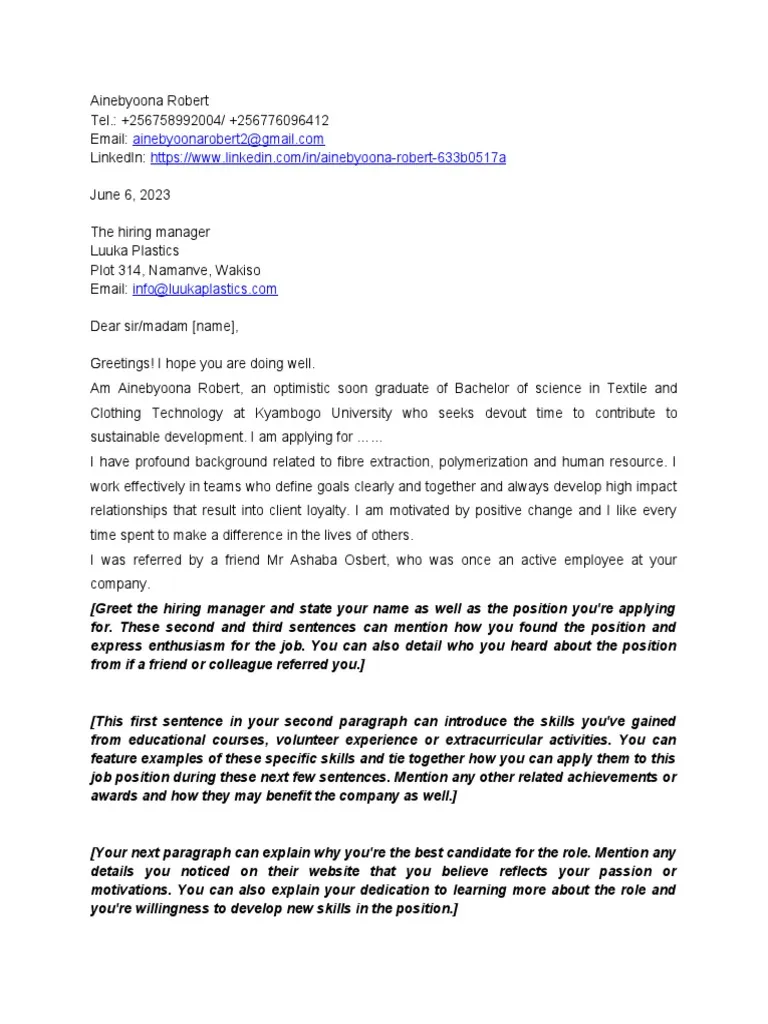
Use action verbs to describe your accomplishments and responsibilities. This makes your cover letter more dynamic and engaging. Start each bullet point or description with a strong verb. Examples include “managed,” “organized,” “coordinated,” “implemented,” “achieved,” and “developed.” Use strong language throughout your letter to highlight your skills and enthusiasm. Avoid passive language and instead use active and descriptive words that showcase your abilities.
Tips for Standing Out From the Crowd
To make your cover letter stand out, personalize it to each job application, demonstrating your genuine interest in the specific role and company. Mention any unique skills, experiences, or interests that align with the job requirements. Research the company’s culture and values and incorporate them into your letter. Show, don’t just tell. Instead of just stating your skills, provide specific examples of how you’ve used them to achieve results. These are strategies to help your application shine.
Tailoring Your Letter to Each Application
Customize your cover letter for each job application. Don’t use a generic template for every position. Review the job description carefully and identify the key skills and qualifications the employer is seeking. Tailor your letter to highlight your relevant experience and skills. Use keywords from the job description to make your application more relevant. Personalizing your cover letter demonstrates your dedication to the specific opportunity and increases your chances of getting an interview.
Showcasing Volunteer Experience and Projects
If you lack direct event planning experience, use volunteer work or personal projects to your advantage. Highlight any volunteer roles where you organized events, managed teams, or handled logistical tasks. Describe any projects you’ve undertaken that involved planning, coordination, or execution. Provide specific details about your responsibilities and the outcomes of your work. This demonstrates your ability to plan, execute, and manage events, even without formal experience.
Highlighting Soft Skills
Event coordination requires strong soft skills. Emphasize your communication, teamwork, problem-solving, and time-management abilities. These skills are highly transferable and valuable in any role. Provide specific examples of how you’ve used these skills in previous experiences to achieve positive results. Highlighting your soft skills will demonstrate your ability to work effectively in a team, manage stress, and adapt to unexpected challenges, all of which are crucial for a successful event coordinator.
Examples of Soft Skills
Here are some examples of soft skills that are crucial for event coordinators: communication (written and verbal), active listening, teamwork, leadership, problem-solving, time management, organization, attention to detail, adaptability, and conflict resolution. For example, you could highlight your ability to communicate effectively with vendors, manage a team during event setup, or quickly resolve issues that arise during an event. Focus on the soft skills that align with the job description and provide compelling examples.
Demonstrating Organizational Abilities
Event coordinators need exceptional organizational skills. Highlight your ability to manage multiple tasks, prioritize responsibilities, and stay organized under pressure. Provide examples of how you’ve used organizational tools or techniques to manage projects, meet deadlines, and achieve goals. Show how you’ve successfully managed budgets, created timelines, and coordinated logistics in previous roles or activities. Demonstrating your organizational skills will prove your ability to handle the complex demands of an event coordinator role.
Including a Portfolio or Examples of Work
If possible, include a portfolio or examples of your work. This is a great way to showcase your skills and abilities, especially if you have limited experience. If you have designed event marketing materials, created event schedules, or managed event budgets, include these examples in your portfolio. If you don’t have a formal portfolio, consider including links to your social media profiles or a personal website that showcases your relevant projects or skills. This provides the hiring manager with tangible evidence of your qualifications.
